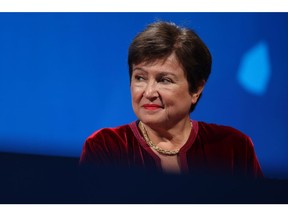Alberta Premier Jason Kenney meets with Deputy Prime Minister Chrystia Freeland in Calgary, Tuesday, Jan. 7, 2020.
After yet another month of discouraging jobs numbers for Alberta, it’s certainly fair and understandable to wonder who and/or what is responsible for the province’s stubborn unemployment problem.
Depending on whom you ask, the answer might be Jason Kenney, Rachel Notley, Justin Trudeau, Donald Trump, or simply global economic forces beyond our control. Perhaps the answer might even be some variation of “all of the above.”
There’s typically not one simple explanation — or one identifiable hero or villain — when it comes to such matters, which can be inconvenient for those engaged in partisan bloodsport. Depending on one’s partisan stripes, the governing party is entitled to all of the credit or all of the blame when it comes to economic news. Governments probably get too much credit and too much blame for the state of the economy, as it is. Such is politics, though.
That’s not to suggest that there is no accountability or that policies don’t matter. And for a government that promised not only to create jobs but also to end the “job-killing” policies of its predecessors, it’s reasonable to judge it on this point.
I would argue, though, that for this government — or any government — a period of less than a year is insufficient to conclude whether it has failed to deliver improved economic outcomes. But if indeed Alberta’s unemployment story is a much rosier one in a year or two, that doesn’t automatically mean that the government deserves all the credit, either.
“Where are the jobs, Jason?” the Alberta Federation of Labour demanded to know last week. As you might have guessed, it was not a question it ever asked of Jason’s predecessor. The extent to which a premier is to blame for such things depends largely on your partisan zeal and the holder of that particular office.
But if we accept the premise of the question, shall we expect the AFL to then give kudos to the government if and when we see meaningful progress on the jobless front? Don’t hold your breath.
But partisan zeal cuts both ways. While government defenders might rightly note the complexities of this challenge and the need for patience, there wasn’t such nuance four years ago. By early 2016, the opposition was already blaming the NDP’s “job-killing” policies for the rise in unemployment. And, yes, the Kenney-blamers sounded much like 2020’s Kenney-defenders.
There are also defenders of the current government who would blame the prime minister and his government for Alberta’s continued woes. And while Ottawa is not blameless, would those same people then concede that Trudeau is responsible for Canada’s 40-year lows in unemployment? Probably not.
Moreover, though, Kenney did not put a caveat on his jobs promise. It was not premised on a change in government in Ottawa or favourable changes in various external factors. If you are trying to convince Albertans that a premier can greatly affect the number and quality of jobs available in the province, don’t complain when they hold you to that. Live by the sword, die by the sword, as they say.
While it’s unfair to conclude at this point that the government’s approach has failed, that becomes less unfair the longer it is in power. There’s much on the government’s plate at the moment, but it’s hard to see how job creation isn’t or shouldn’t be priority No. 1.
And there is reason for optimism on this front. Economists largely expect to see improvement this year and next, and we are seeing progress on various major energy infrastructure projects.
While there is logic in the government’s approach of making Alberta a more attractive place for investment, it’s also a long-term effort. Does the government believe we need to stay the course and await the eventual payoff, or does it believe that at some point more urgency and a new or different strategy might be warranted? One needn’t be a partisan to ask those questions.
“Afternoons with Rob Breakenridge” airs weekdays 12:30-3:30pm on 770 CHQR rob.breakenridge@corusent.com Twitter: @RobBreakenridge





















Comments